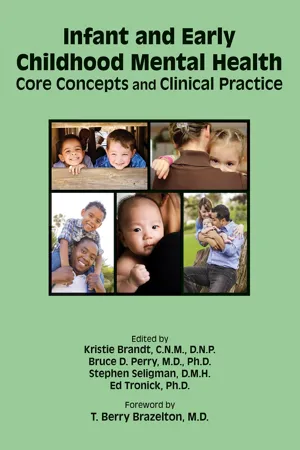
Infant and Early Childhood Mental Health
Core Concepts and Clinical Practice
- 381 pages
- English
- ePUB (mobile friendly)
- Available on iOS & Android
Infant and Early Childhood Mental Health
Core Concepts and Clinical Practice
About This Book
Infant and Early Childhood Mental Health: Core Concepts and Clinical Practice is a groundbreaking book that provides an overview of the field from both theoretical and clinical viewpoints. The editors and chapter authors -- some of the field's foremost researchers and teachers -- describe from their diverse perspectives key concepts fundamental to infant-parent and early childhood mental health work. The complexity of this emerging field demands an interdisciplinary approach, and the book provides a clear, comprehensive, and coherent text with an abundance of clinical applications to increase understanding and help the reader to integrate the concepts into clinical practice.
Offering both cutting-edge coverage and a format that facilitates learning, the book boasts the following features and content:
• A focus on helping working professionals expand their specialization skills and knowledge and on offering core competency training for those entering the field, which reflects the Infant-Parent Mental Health Postgraduate Certificate Program (IPMHPCP) and Fellowship in Napa, CA that was the genesis of the book.• Chapters written by a diverse group of authors with vastly different training, expertise, and clinical experience, underscoring the book's interdisciplinary approach. In addition, terms such as clinician, therapist, provider, professional, and teacher are intentionally used interchangeably to describe and unify the field. • Explication and analysis of a variety of therapeutic models, including Perry's Neurosequential Model of Therapeutics; Brazelton's neurodevelopmental and relational Touchpoints; attachment theory; the Neurorelational Framework; Mindsight; and Downing's Video Intervention Therapy.• An entire chapter devoted to diagnostic schemas for children ages 0--5, which highlights the Diagnostic Classification of Mental Health Disorders of Infancy and Early Childhood: Revised (DC: 0-3R). With the release of DSM-5, this chapter provides a prototypical crosswalk between DC: 0-3R and ICD codes.• A discussion of the difference between evidence-based treatments and evidence-based practices in the field, along with valuable information on randomized controlled trials, a research standard that, while often not feasible or ethically permissible in infant mental health work, remains a standard applied to the field.• Key points and references at the end of each chapter, and generous use of figures, tables, and other resources to enhance learning.
The volume editors and authors are passionate about the pressing need for further research and the acquisition and application of new knowledge to support the health and well-being of individuals, families, and communities. Infant and Early Childhood Mental Health: Core Concepts and Clinical Practice should find a receptive audience for this critically important message.
Frequently asked questions
Information
Table of contents
- Cover Page
- Title Page
- Copyright Page
- Dedication
- Contents
- Contributors
- Foreword
- Preface
- Acknowledgments
- 1 Core Concepts in Infant-Family and Early Childhood Mental Health
- 2 The Neurosequential Model of Therapeutics: Application of a Developmentally Sensitive and Neurobiology-Informed Approach to Clinical Problem Solving in Maltreated Children
- 3 Typical and Atypical Development: Peek-a-Boo and Blind Selection
- 4 Brazelton’s Neurodevelopmental and Relational Touchpoints and Infant Mental Health
- 5 The Neurorelational Framework in Infant and Early Childhood Mental Health
- 6 Attachment Theory: Implications for Young Children and Their Parents
- 7 Psychoanalytic and Psychodynamic Theory: Play Therapy for Young Children
- 8 Interpersonal Neurobiology, Mindsight, and Integration: The Mind, Relationships, and the Brain
- 9 Basics of Counseling in Infant-Parent and Early Childhood Mental Health
- 10 Behavioral Epigenetics and the Developmental Origins of Child Mental Health Disorders
- 11 DC:0-3R: A Diagnostic Schema for Infants and Young Children and Their Families
- 12 Fussy Babies: Early Challenges in Regulation, Impact on the Dyad and Family, and Longer-Term Implications
- 13 Developmental and Dyadic Implications of Challenges With Sensory Processing, Physical Functioning, and Sensory-Based Self-Regulation
- 14 Autism Spectrum Disorders: The Importance of Parent-Child Relationships
- 15 Touch in Parent-Infant Mental Health: Arousal, Regulation, and Relationships
- 16 Developmental Psychopathology: Core Principles and Implications for Child Mental Health
- 17 Video Intervention Therapy for Parents With a Psychiatric Disturbance
- 18 Evidence-Based Treatments and Evidence-Based Practices in the Infant-Parent Mental Health Field
- 19 Transforming Clinical Practice Through Reflection Work
- 20 Attachment, Intersubjectivity, and Mentalization Within the Experience of the Child, the Parent, and the Provider
- Index
- Footnotes